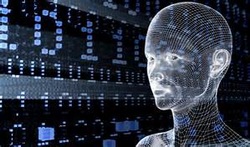Technology of the Future: Artificial Intelligence
Arona Jones

Artificial intelligence (AI) is just beginning to move from science fantasy into science reality. The possibilities of this new field, as with so many others currently emerging are exciting. In brief, an artificial intelligence is a machine or device that is capable of ‘intelligent thought’ - which could mean sentience. Currently, computers and robots are very good at repetitive tasks, like assembling parts of a car on an assembly line, but anything that requires imaginative thought, like art or writing, would require an AI.
Various projects are working on creating AI, mostly (but not solely) in the form of ‘neural networks’ which are computers capable of learning, emulating to a certain extent the structure of a biological brain. To do so, however, is a daunting task. A human brain has in excess of 100 trillion (1 with fourteen zeros after it!) synapses, meaning it is processing, in computing terms, at least terabytes of data each second, orders of magnitude higher than current mechanical (i.e. not including quantum computing) processing capacity.
An example of this is Google’s DeepDream, which can generate images by combining those it finds on the internet. The results are often surreal. OpenAI, in which Elon Musk is involved, is another example of such a project, although they add the admirable goal of benefiting humanity as a whole, and note that they are not driven by need for financial return (which is made possible through the backing of people like Musk).
Unfortunately, artificial intelligence may be dangerous, just as biological intelligences can be. Fiction has had a long time explore the possibilities, and notably the dangers, of creating an artificially intelligent being, from The Matrix to Ex Machina. However, a single AI may have the potential to be much more dangerous than any biological intelligence - theoretically an AI could spread across the internet, and gain control of anything linked in, which in this day and age includes nuclear missiles. This ‘rogue’ AI would be almost impossible to shut down, or even impede. A ‘SkyNet scenario’ is becoming a near-future possibility, although the chances should be slim.
The morality of this emerging field is also in question - is an intelligence less valuable if it is in a mechanical rather than biological body? Does the method of its creation make a difference? Science and engineering is often preoccupied with innovation, and might not stop to think whether or not we should do something.
Overall however, artificial intelligence is an exciting technology under rapid development even as I type this. Just as the advent of the computer ushered in the current modern age, the creation of groundbreaking technology like AI, virtual/augmented reality and 3D printing, combined with new innovation in (relatively!) old fields like spaceflight has the potential to bring a new-age revolution within our lifetimes. The future is close, one could say.
Various projects are working on creating AI, mostly (but not solely) in the form of ‘neural networks’ which are computers capable of learning, emulating to a certain extent the structure of a biological brain. To do so, however, is a daunting task. A human brain has in excess of 100 trillion (1 with fourteen zeros after it!) synapses, meaning it is processing, in computing terms, at least terabytes of data each second, orders of magnitude higher than current mechanical (i.e. not including quantum computing) processing capacity.
An example of this is Google’s DeepDream, which can generate images by combining those it finds on the internet. The results are often surreal. OpenAI, in which Elon Musk is involved, is another example of such a project, although they add the admirable goal of benefiting humanity as a whole, and note that they are not driven by need for financial return (which is made possible through the backing of people like Musk).
Unfortunately, artificial intelligence may be dangerous, just as biological intelligences can be. Fiction has had a long time explore the possibilities, and notably the dangers, of creating an artificially intelligent being, from The Matrix to Ex Machina. However, a single AI may have the potential to be much more dangerous than any biological intelligence - theoretically an AI could spread across the internet, and gain control of anything linked in, which in this day and age includes nuclear missiles. This ‘rogue’ AI would be almost impossible to shut down, or even impede. A ‘SkyNet scenario’ is becoming a near-future possibility, although the chances should be slim.
The morality of this emerging field is also in question - is an intelligence less valuable if it is in a mechanical rather than biological body? Does the method of its creation make a difference? Science and engineering is often preoccupied with innovation, and might not stop to think whether or not we should do something.
Overall however, artificial intelligence is an exciting technology under rapid development even as I type this. Just as the advent of the computer ushered in the current modern age, the creation of groundbreaking technology like AI, virtual/augmented reality and 3D printing, combined with new innovation in (relatively!) old fields like spaceflight has the potential to bring a new-age revolution within our lifetimes. The future is close, one could say.